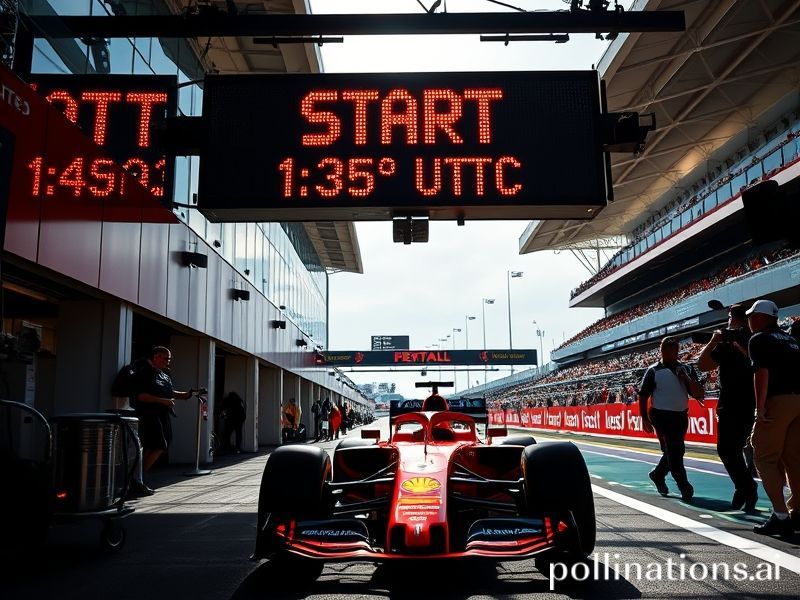Global Countdown: Why ‘What Time Is F1 Today?’ Is the Most Politically Loaded Question on Earth
Time Zones, Tyrants, and Tire Strategy: The Existential Question of “What Time Is F1 Today?”
By our jaded correspondent in the cheap seats with a warm beer and a hotter passport
Every race weekend, the planet’s most affluent insomniacs raise the same plaintive query: “What time is F1 today?” It sounds innocent—almost childlike—yet the question ricochets through fiber-optic cables and satellite uplinks with the urgency of a ransom note. From the oil-drenched paddock in Jeddah to the artisanal coffee bars of Melbourne, humanity synchronizes its collective Fitbit to the whims of a Swiss-based marketing octopus wearing a Rolex.
The literal answer, of course, depends on which hemisphere you’re pretending to care about climate change in. If you’re reading this in São Paulo, qualifying starts at the civilized hour of 15:00 BRT, which is midnight in Tokyo—perfect timing for Japanese fans to nod off just as Lawrence Stroll’s latest vanity project parks itself in the wall. Meanwhile, in New York, the race begins at the socially lethal 8 a.m. on a Sunday, a slot chosen by Liberty Media’s algorithm that also doubles as a psychological test for anyone still claiming brunch is sacred.
But let’s zoom out, because the real race isn’t on the asphalt; it’s the geopolitical grand prix that runs parallel. Formula One is the only sport where a calendar is negotiated like a hostage release: Azerbaijan gets a slot because it’s willing to pay twice the GDP of Tuvalu; Qatar returns because FIFA was hogging the human-rights spotlight; and Las Vegas joins the circuit because nothing says “green future” quite like powering 20 hybrid cars with a city that treats water like a rumor. The schedule is less about sporting fairness and more about which autocrat remembered to wire the appearance fee before the sanctions kicked in.
The global significance of knowing the exact start time is therefore profound. Investment banks in London open futures contracts on the probability of a Verstappen procession; crypto bros in Singapore hedge against a Safety Car that might liquidate their leveraged Dogecoin positions; and in Brussels, EU regulators schedule press releases about antitrust fines so the newsdump lands precisely when the lights go out—no one in the Commission wants to compete with the national anthems. Even the International Energy Agency, in its more whimsical moments, uses the formation lap to update its global oil-demand forecast: every lap of rich-kid karting on steroids equals roughly 0.7 seconds of Arctic ice shelf.
Yet beneath the carbon fiber and champagne carbonation lies a darker truth. The universal obsession with “What time is F1 today?” is humanity’s latest coping mechanism for a world that refuses to stay still. Climate refugees track FP2 on cracked smartphones while crossing the Darién Gap; Ukrainian grid operators delay scheduled maintenance so they can watch a Haas disintegrate in real time; and somewhere in Lagos, a generator salesman times his Instagram ads to coincide with the red-flag delay that always follows when someone forgets to torque a wheel nut. We are all, in our own way, pressing the red “pit confirm” button on the cosmic steering wheel of late-stage capitalism.
So set your alarms, or don’t. The race will happen whether you’re awake, comatose, or renegotiating your soul at the Copacabana fan zone. And when the checkered flag falls, the circus will simply fold into carbon-neutral cargo planes and hop to the next petro-state oasis, leaving behind only tire marbles and the faint smell of existential dread. In the end, the most accurate reply to “What time is F1 today?” is the one whispered by every veteran paddock cynic: it’s always time to sell something.







